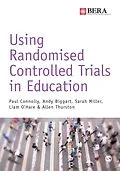The use of randomised controlled trials (RCTs), most commonly a medical sciences research tool, is a hotly debated topic in Education. This book examines the controversial aspects of RCTs in Education and sets out the potential and pitfalls of the method.
Drawing on their own extensive experience of running RCTs, and their work at the Centre for Evidence and Social Innovation (CESI) at Queen's University, Belfast, the authors provide a thorough practical introduction to the use of randomised controlled trials in education. Using real data sets, chapters equip the reader with all of the key knowledge and skills required to design, run, analyse and report an RCT.
Coverage includes:
· Step-by-step guidance on analysing data
· How to assess the reliability and validity of results
· Advice on balancing the demands of various stakeholders
Essential reading for postgraduate and more experienced researchers, as well as teachers and educationalists seeking to increase their knowledge and understanding of the use of such methods in education.
Inhalt
Introduction: Debunking the Myths about RCTs in Education
What RCTs Can and Cannot Tell Us
How to Use Logic Models to Understand Interventions and Identify Outcomes
How to Design and Run an RCT in Education
How to Analyse the Findings from a Simple RCT
How to Analyse the Findings from a Cluster RCT
How to Analyse the Findings from RCTs that Include Binary Outcome Variables
How to Report RCTs and Synthesise Evidence from Different Trials
